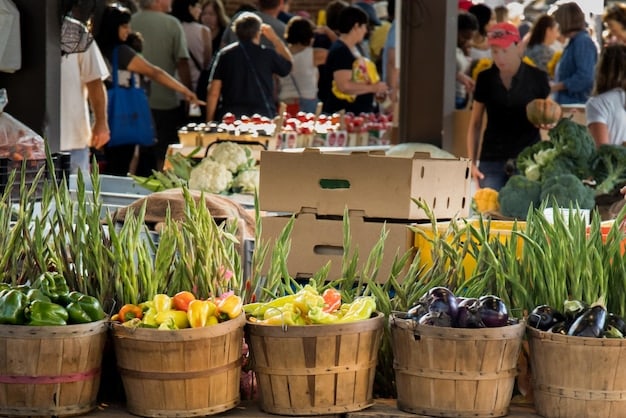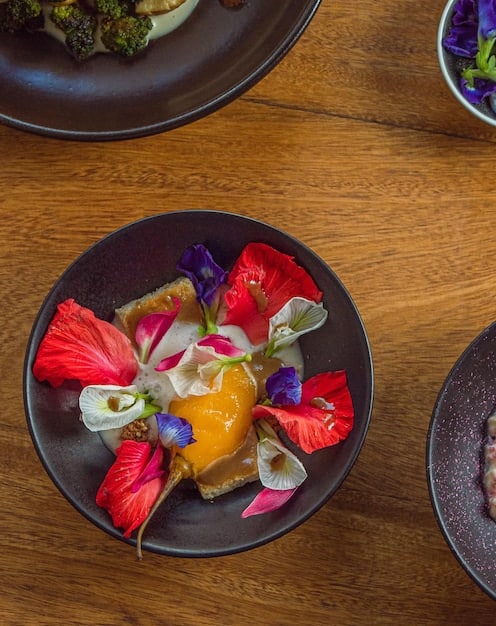Ethical Eating on the Road: US Farmers & Sustainable Restaurants

Ethical eating on the road in the US involves supporting local farmers and sustainable restaurants, reducing your environmental impact while enjoying fresh, seasonal cuisine and contributing to the local economy.
Embarking on a road trip offers a unique opportunity to explore the diverse landscapes and culinary delights of the United States. It also presents a chance to practice ethical eating on the road: supporting local farmers and sustainable restaurants in the US. By making conscious food choices, travelers can contribute to the well-being of communities and the environment.
Why Choose Ethical Eating on the Road?
Choosing ethical eating while traveling isn’t just about personal health; it’s about making mindful choices that positively impact communities and the environment. By prioritizing local, sustainable options, you’re voting with your wallet for a better food system.
Supporting Local Economies
When you opt for food from local farmers and restaurants, you’re directly investing in the economic health of those communities. This keeps money circulating locally, supporting jobs and small businesses.
Reducing Environmental Impact
Sustainable restaurants prioritize eco-friendly practices. Choosing local food reduces transportation emissions, uses less packaging, and promotes biodiversity through sustainable farming methods.

Healthier Food Options
Local and sustainably produced food is often fresher and contains fewer additives. You’re more likely to find seasonal produce packed with nutrients, benefiting your health and well-being.
Here are some practical ways to embrace ethical eating on your next road trip:
- Visit farmers’ markets to purchase fresh, local produce for snacks and meals.
- Seek out restaurants that prioritize locally sourced ingredients and sustainable practices.
- Inquire about the origins of food and supporting farms.
- Pack your own reusable containers and utensils to minimize waste.
Choosing ethical eating on the road is a conscious choice that promotes healthier communities and a healthier planet. Your road trip can become an adventure in sustainability.
Finding Local Farmers and Markets
One of the most rewarding ways to practice ethical eating is by connecting directly with local farmers. Farmers’ markets offer a unique opportunity to access fresh, seasonal produce while supporting the people who grow your food.
Utilizing Online Resources
Websites like Local Harvest and the USDA National Farmers Market Directory are excellent resources for locating farmers’ markets and local farms across the US, allowing you to plan ahead.
Engaging with Local Communities
Reach out to local tourism boards, visitor centers, or community groups for recommendations on the best markets and farm stands in the area. Local knowledge can lead you to hidden gems.
Benefits of Farmers’ Markets
Shopping at farmers’ markets allows you to meet farmers, learn about their practices, and understand where your food comes from. The food is often fresher, tastier, and more diverse compared to conventional grocery stores.

When visiting farmers’ markets, look for the following indicators of ethical and sustainable practices:
- Organic Certification: Indicates that the farm meets strict standards for organic production.
- Biodynamic Farming: An even more holistic approach to agriculture, focusing on soil health and ecological balance.
- Direct Sales: Farmers selling directly to consumers, ensuring a fair price for their products.
Exploring local farmers markets is one of the most direct ways to engage with ethical eating, and discovering the unique flavors from farms across the country.
Identifying Sustainable Restaurants
Sustainable restaurants are committed to minimizing their environmental impact and supporting local communities. Knowing how to identify and patronize these establishments can make a significant difference.
Certifications and Labels
Look for certifications such as the Green Restaurant Association or labels indicating sustainable practices. These certifications often mean the restaurant has met rigorous standards for environmental responsibility.
Transparency and Sourcing
Sustainable restaurants often clearly communicate where they source their ingredients. They usually prioritize local farmers and producers, emphasizing seasonal menus and transparency in food sourcing.
Waste Reduction and Composting
Many sustainable restaurants implement waste reduction strategies, such as composting food scraps, recycling, and using reusable or biodegradable packaging. These efforts help minimize the restaurant’s environmental footprint.
Here are some questions to ask when trying to determine a restaurant’s sustainability practices:
- Where do you source your ingredients?
- Do you compost or recycle?
- Do you have any certifications related to sustainability?
Identifying and supporting sustainable restaurants ensures that your dining choices align with your values, contributing to a more responsible food system.
Tips for Planning an Ethical Eating Road Trip
Planning an ethical eating road trip requires some thoughtful preparation. By taking a few extra steps, you can ensure your travels are both enjoyable and sustainable.
Researching Destinations
Before setting out, research the areas you’ll be visiting. Identify local farmers’ markets, sustainable restaurants, and food co-ops along your route. Online resources and local guides can be invaluable.
Packing Essentials
Pack essential items such as reusable water bottles, coffee cups, containers, and utensils. Reducing single-use plastics is a simple yet effective way to minimize waste.
Planning Meals and Snacks
Plan some meals and snacks in advance. Preparing your own food using local ingredients not only reduces costs but also ensures that you’re eating ethically. Visit farmers’ markets to stock up on fresh produce for picnics and meals on the go.
Here are some essential items to pack for your ethical eating road trip:
- Reusable water bottles and coffee cups
- Reusable containers for leftovers
- Utensils made of bamboo or stainless steel
- Cloth shopping bags
With a little planning, your road trip can be an eco-friendly culinary adventure. Embrace the opportunity to discover new flavors while supporting local communities and sustainable practices.
Overcoming Challenges and Staying Committed
Maintaining ethical eating habits on the road can present some challenges. However, with a few strategies, you can stay committed to your values and continue making responsible food choices.
Limited Options
In some areas, finding sustainable options may be limited. Be prepared to do some extra research or consider adjusting your meal plans accordingly. Explore grocery stores and smaller markets for healthier alternatives.
Convenience vs. Ethics
It can be tempting to opt for fast food or convenient options when you’re short on time. Try to balance convenience with your ethical goals by choosing quick, healthy snacks or making informed decisions when eating out.
Budget Considerations
Eating ethically can sometimes be more expensive. Prioritize your spending by focusing on essential items and seeking out affordable options at farmers’ markets and local co-ops.
Consider these solutions to potential challenges:
- Bring a portable cooler to store fresh produce and leftovers.
- Use apps that locate sustainable restaurants and markets.
- Be open to trying new and diverse cuisines that prioritize local ingredients.
Staying committed to ethical eating on the road requires flexibility, planning, and a willingness to embrace new experiences. The rewards are well worth the effort, both for you and the communities you support.
The Future of Ethical Eating and Travel
As awareness of ethical and sustainable practices grows, the future of ethical eating and travel looks promising. More travelers are seeking authentic, responsible experiences, driving positive change in the food and tourism industries.
Growing Demand for Sustainability
Consumers are increasingly demanding transparency and sustainability from businesses. This trend is pushing restaurants and food producers to adopt more ethical practices.
Technological Innovations
Technological advancements are making it easier to find and support sustainable options. Apps and online platforms are connecting travelers with local farmers, markets, and restaurants.
Community-Based Tourism
Community-based tourism initiatives are empowering local communities by providing economic opportunities and preserving cultural traditions. Supporting these initiatives can enhance your travel experience while contributing to sustainable development.
Expect to see further development in the following areas:
- More restaurants emphasizing farm-to-table dining
- Increased availability of organic and locally sourced food products
- Wider adoption of sustainable packaging and waste reduction practices
The future of ethical eating and travel requires collaboration among consumers, businesses, and policymakers. By supporting responsible practices, we can create a more sustainable and equitable world for future generations.
| Key Point | Brief Description |
|---|---|
| 🧑🌾 Support Local Farms | Buy produce directly from farmers’ markets to boost local economies. |
| 🌱 Choose Sustainable Restaurants | Look for restaurants with certifications and transparent sourcing practices. |
| 🗑️ Reduce Waste | Pack reusable containers and utensils to minimize single-use plastics. |
| 🗺️ Plan Ahead | Research ethical options on your route to stay committed to your values. |
FAQ
▼
Ethical eating involves making conscious food choices that consider the impact on animals, the environment, and social justice. It’s about supporting sustainable practices and fair labor standards.
▼
Use online resources like Local Harvest and the USDA National Farmers Market Directory. Local tourism boards and visitor centers can also provide recommendations for the best markets.
▼
Look for certifications like the Green Restaurant Association, transparency in sourcing, waste reduction efforts, and seasonal menus featuring local ingredients. Don’t hesitate to ask about their practices.
▼
It can be, but there are ways to make it affordable. Prioritize essential items, shop at farmers’ markets for deals, and plan some of your meals using local ingredients. Cook for yourself when you can!
▼
Essentials include reusable water bottles, coffee cups, containers, utensils, and cloth shopping bags. These items help minimize waste and support sustainable practices on the go.
Conclusion
Embracing ethical eating on the road: supporting local farmers and sustainable restaurants in the US not only enhances your travel experience but also makes a meaningful contribution to communities and the planet. By making conscious food choices, you can turn your road trip into a journey of sustainability and mindful consumption.





